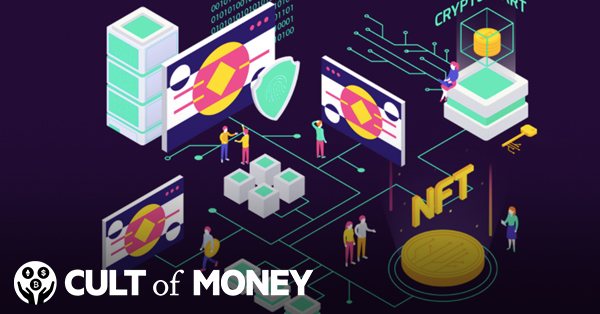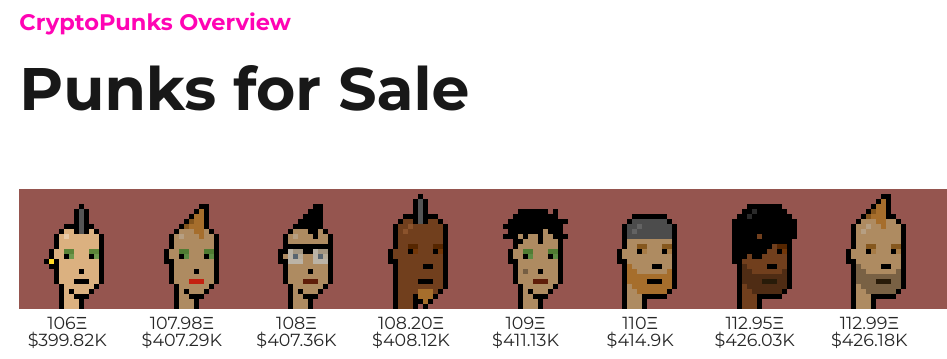
When you think about blockchain technology, cryptocurrencies like Bitcoin and Ethereum probably come to mind first.
After all, cryptocurrency investing has seen a boom in recent years, and this alternative investment class is becoming more common.
However, blockchain is more than cryptocurrency. And, more recently, investors and collectors alike have been focusing on a different technology altogether: NFTs.
NFTs are unique digital assets that verify ownership for digital or tangible goods. But why are investors flocking to this emerging blockchain technology. And are NFTs just another bubble or are they here to stay? This article covers everything you need to know about how NFTs work and how to decide if investing in this space is right for you.
What Is An NFT?
Non-fungible tokens (NFTs) are blockchain-based digital assets that verify ownership for digital and real-life goods. NFTs are often used for artwork, but you can also find them for collectible sports cards, albums, movies, and even virtual real estate. In fact, people like Jack Dorsey, the co-founder of Twitter, have even sold Tweet NFTs for millions of dollars.
NFTs might seem more meme-like than logical, but the technology has serious implications. Thanks to NFTs, artists and digital creators have a new way to sell digital assets, and collectors and investors have the security of knowing what they’re buying is authentic.
While NFT hype is new, the technology isn’t. According to Portion, Kevin McCoy created the first NFT in 2014 when he created a non-fungible token called “Quantum” as a piece of digital art. In 2017, CryptoPunks, which are collectible characters where ownership proof is stored on the Ethereum blockchain, started selling for thousands of dollars a piece.
The rest is history. According to Reuters, the NFT market saw $2.5 billion in sales in the first half of 2021. That's up from a mere $13.7 million in the first half of 2020.
How Do NFTs Work?
When someone buys a Tweet for $2.5 million worth of Ethereum, it’s easy to think of NFTs as being nonsensical. After all, couldn’t you screenshot a picture of that same Tweet and print it (spoiler alert: yes you could)? And why would someone want to buy ownership of a digital asset like a Tweet in the first place?
To understand the NFT craze, it’s important to understand what "non-fungible" means. Fungibility means units of a good are interchangeable with one another. For example, you could trade a $10 USD bill for another $10 USD bill and be left with the same value. Cryptocurrencies like Bitcoin have the same property.
Non-fungible assets don’t share this property. When you buy an NFT, you're purchasing a completely unique asset. Most NFTs operate on the Ethereum blockchain, and this is where proof of ownership is recorded. Because NFTs use blockchain technology, ownership can also be anonymous. And it’s practically impossible to tamper with or destroy NFT records.
So, when you buy an NFT of a Tweet, album poster, or piece of digital artwork, you actually own that asset even though it might not be tangible. This is even true if you compare two identical-appearing NFTs. And when you think about the possibilities of this type of digital ownership, it’s easy to see why NFTs are catching on.
For example, musicians can now release limited-edition vinyl alongside NFTs of signed album artwork. This is what artist 3LAU did, except his vinyl record NFT is also redeemable for a custom song by 3LAU, a bonus physical vinyl, and access to unreleased music; hardly just a pretty digital asset.
Why Do People Invest In NFTs?
The nature of NFTs means that owning one is like owning a one-of-a-kind asset. This is the same concept as owning the real Mona Lisa or a Monet.
Sure, people can make prints of that artwork or take pictures. But it’s ownership of the authentic, original piece that’s valuable.
Fungible | Non-Fungible |
|---|---|
Dollar | Art |
Bitcoin | NFTs |
Gold | Home Source: PublicDomainPictures.Net |
So scarcity is the main factor that gives NFTs value, provided people find value in what a NFT represents. But if you’re a massive Lebron James fan, who says paying $208,000 for a video of James dunking is irrational? Is this really different from spending that money on a piece of artwork or a sports trading card?
Therefore, one of the main reasons people invest in NFTs is because they are collectors. And, just like investing in artwork or fine wine, investors are crowding the NFT space to try and make money with the surge in interest.
How Do You Invest In NFTs?
Investing in NFTs can also take different routes. For some, buying and flipping NFTs surrounding popular topics, like sports or video games, is one strategy. For investors like Mark Cuban, creating an entire NFT art gallery is how he’s getting involved in this new alternative asset class.
It’s still important for investors to consider the risks of NFT investing. This is a new and evolving space. And unlike cryptocurrency investing or investing in stocks, NFTs are far more speculative.
However, NFTs aren’t going anywhere. And the technology may disrupt how artists, content creators, and even massive companies all engage with consumers in the digital realm.
Where Can You Find NFTs?
Since most NFTs are based on the Ethereum blockchain, you typically buy NFTs with ETH. This means using a popular cryptocurrency exchange like Binance or Coinbase to buy ETH, connecting your wallet to an NFT marketplace, and then buying an NFT that catches your eye.
There are numerous NFT marketplaces that have sprung up within the past few years. Some of the most popular ones include:
- Mintable: A free way to sell NFTs you create or to buy NFTs under categories like artwork, collectible, video game items, and music.
- NBA Top Shot: Lets you buy officially licensed NFTs from the top moments in the NBA.
- OpenSea: The largest NFT marketplace with categories like artwork, music, domain names, collectibles, trading cards, and sports.
- Rarible: Another popular marketplace that’s similar to OpenSea but also includes NFT categories like memes and even call options on different cryptocurrencies.
Many NFTs range from $50 to a few hundred dollars worth of Ethereum. However, some NFTs sell for thousands or even hundreds of thousands of dollars. And, the most expensive NFTs of all time include NFTs like Everydays: The First 5,000 Days, which sold for over $69 million and CryptoPunk 7523, which sold for over $11 million.
This is just the tip of the iceberg for what’s ahead for NFTs. For example, people are already buying and selling virtual real estate. This might sound insane, but what if people attend digital concerts or corporate events in a metaverse venue in the future? Suddenly, owning a virtual building where you can charge for admission or have massive brands sponsor digital events makes more sense.
Final Thoughts
Overall, the NFT boom is just beginning. Right now, investing in NFTs is still like the wild west and isn’t something you should do lightly. As with cryptocurrency investing, you should do your due diligence and never invest money you can’t afford to lose.
For the foreseeable future, NFTs will remain a speculative play that shouldn’t make up the bulk of your portfolio. In fact, it might be better to familiarize yourself with buying cryptocurrency or earning interest with crypto through a platform like Celsius before making the jump to NFTs.
But there’s no denying this is a growing space with immense potential. And if you want to diversify your holdings by diving into the world of blockchain and NFTs, you have more options than ever before.

Tom Blake is a personal finance writer with a passion for making money online, cryptocurrency and NFTs, investing, and the gig economy.



